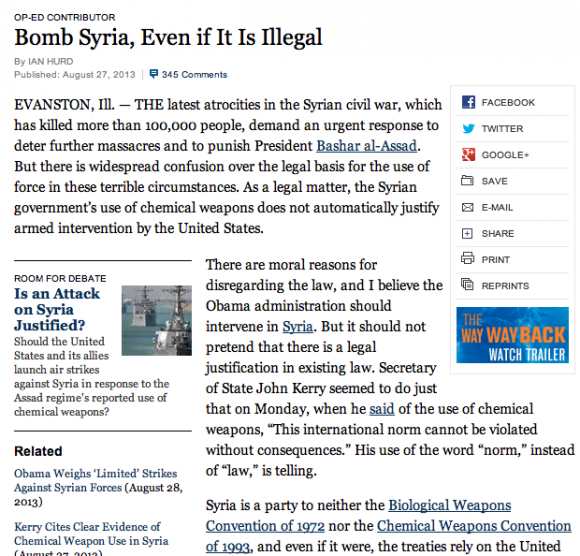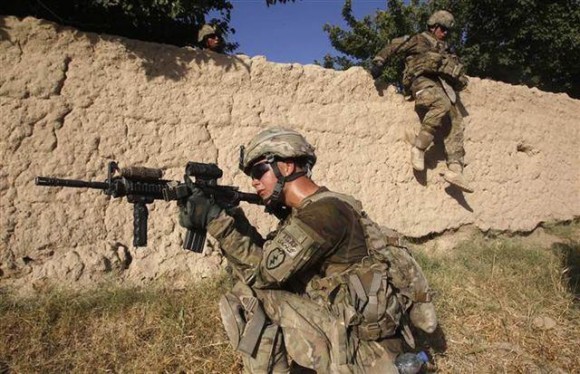
“You know how I stayed alive this long? All these years? Fear. The spectacle of fearsome acts. Somebody steals from me, I cut off his hands. He offends me, I cut out his tongue. He rises against me, I cut off his head, stick it on a pike, raise it high up so all on the streets can see. That’s what preserves the order of things. Fear.” -Bill the Butcher, Gangs of New York
In Martin Scorsese’s fictional historical drama of mid-19th century New York gang violence, the main antagonist, played by Daniel Day Lewis, is called Bill the Butcher. He is a ruthless gang leader who spouts nativist racial denigrations and uses sensational displays of extreme violence to gain power, territorial control, and obedience. In one scene, draped in a tattered American flag, Bill describes how he has kept his power all this time by instilling fear into all his subjects and adversaries – fear from credible threats of violence.
That is essentially a microcosm of how the United States behaves in the international sphere. This principle of ruling by fear and violence, a time-honored tactic of every spiteful thug and mafia don, is one of the primary drivers of the push for President Obama to attack Syria.
In Pentagon-ese, this principle is called “credibility,” but it’s true meaning is much darker than its Orwellian formulation. The Syrian regime has crossed Obama’s “red-line” and so America must prove to Bashar al-Assad and to the world that our threats of aggression and violence are credible, or so the argument goes.
There is a perfect example of this line of thinking in yesterday’s Washington Post. David Ignatius, in a column entitled “In Syria, U.S. credibility is at stake,” asks, “What does the world look like when people begin to doubt the credibility of U.S. power? Unfortunately, we’re finding that out in Syria and other nations where leaders have concluded they can defy a war-weary United States without paying a price.”
If other nations learn they can “defy” their ruler – us – then “the coherence of the global system begins to dissolve,” Ignatius writes. Actually, the technical political science literature has largely put the “credibility” argument to rest. “There’s little evidence that supports the view that countries’ record for keeping commitments determines their credibility,” write two scholars who have studied the concept.
Never mind, this argument for going to war is alive and well in the media punditry and insular foreign policy elite in Washington, D.C.
Here’s what frustrates Ignatius: If Assad thinks America won’t attack him for ordering the use of chemical weapons – an allegation, by the way, that the U.S. admits it hasn’t confirmed – then he’ll violate international law, and American dictates, with impunity.
“What did Assad and his generals think would happen in response to this blatant violation of international norms?” Ignatius asks. “Apparently, not much…”
Consider how hypocritical this position is. He is insisting that the U.S. deal with Assad’s “blatant violation of international norms” by committing another “blatant violation of international norms.” The Obama administration is planning on bombing Syria without the approval of Congress or the United Nations Security Council. That would make the attacks blatantly illegal.
Does America need to be reigned in from flouting international law by a fear of violent retribution? What sort of “credible” consequences does America face for committing criminal acts?
What Ignatius and others really think is that it is the weaker nations that must fear repercussions for criminal acts. The Exceptional Nation, however, needn’t harbor such fears. The law is for us to break with impunity and and for others to obey.
The credibility issue goes beyond just the Assad regime, for Ignatius. America is also sending signals to Iran that we won’t bomb them when we say we will.
“Unfortunately, history tells us that an ambitious, revolutionary nation such as Iran makes compromises only under duress,” Ignatius writes. “U.S. action against Assad may not deter the Iranians, but it will at least make them think twice about crossing Obama’s ‘red line’ against their acquiring nuclear weapons.”
As effective as Bill the Butcher has been in sticking heads on pikes for all to see, the exact opposite is true here. The Iranians have shown that “under duress,” – that is, when they are militarily surrounded, sanctioned, and threatened with daily ultimatums, they are more incentivized to have nuclear weapons capability, in order to deter an attack from the U.S. or Israel.
Where does the U.S. government get this authority to rule the world by force and fear? It’s not in any of the founding documents, and certainly violates the twin national myths that we have traditionally avoided entangling ourselves in the business of other nations and that we spread democracy and freedom. Is this what American voters elect their leaders for, to act like Bill the Butcher?
The United States has neither the legal or the moral authority to enforce alleged violations of international law. It has no business intervening in Syria and certainly not to preserve the mafia thugs’ principle of “credibility.”






